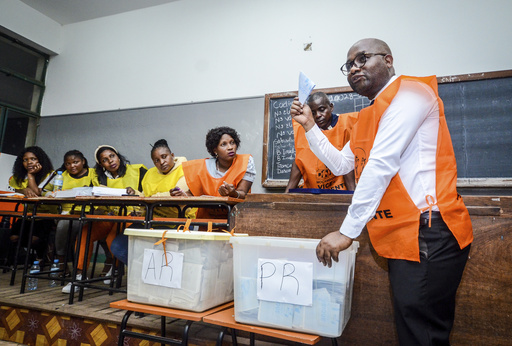
CAPE TOWN, South Africa — Protests erupted in Mozambique’s capital on Thursday, with security forces responding by deploying tear gas and rubber bullets, as the nation faces ongoing unrest following recent elections. This dissatisfaction stems from the results of the presidential election held last month, which allowed the ruling party to maintain its grip on power for over fifty years amidst serious allegations of electoral fraud.
Thousands took to the streets of Maputo and other urban areas to voice their outrage, declaring the outcome of the October 9 election fraudulent. This latest demonstration, reportedly the largest so far, comes after a series of violent confrontations between the police and protesters. Human rights organizations accuse authorities of causing at least 20 fatalities, while local sources suggest the number could exceed 50. As the situation deteriorates, authorities are threatening to deploy military forces to restore order, while protesters have resorted to setting fires in the streets and vandalizing local ruling party offices.
Internet access has been restricted, with numerous social media platforms reportedly blocked, according to allegations from Human Rights Watch. In a show of concern, South Africa has closed its border post with Mozambique and increased security measures in the surrounding areas.
The election in question culminated with the ruling Front for the Liberation of Mozambique’s candidate, Daniel Chapo, being announced as the winner on October 24. This ensures the continuation of Frelimo’s leadership, which has been dominant since Mozambique’s independence from Portugal in 1975, for another five years. Opposition parties had already voiced concerns about potential election fraud even before the results were publicized, claiming instances of ballot stuffing, manipulation of voter rolls, and placement of loyal officials at polling stations. The European Union’s observer team confirmed the presence of irregularities, including the manipulation of certain results, compelling the Constitutional Council to seek clarification from the electoral commission regarding discrepancies.
Opposition candidate Venancio Mondlane, who finished second in the election, has been prominent in criticizing the legitimacy of the results and has initiated calls for national strikes as a form of protest against the alleged vote manipulation. Tensions escalated dramatically following the tragic assassination of key opposition members, including Mondlane’s lawyer and a spokesperson for his party, who were shot while in their vehicle on the night of October 18 by unidentified assailants.
In the wake of these events, Mondlane voiced his belief that the two were targeted, and subsequent protests erupted near the crime scene. However, police responded with force, using tear gas to disperse demonstrators, including journalists covering the protests.
The unrest has since spread across the country, with reports of protesters defacing a statue of outgoing President Filipe Nyusi. Mondlane has chosen to go into hiding out of fear for his safety, making public appeals via social media for continued protests to rid the country of what he describes as decades of oppressive governance.
Zimbabwean authorities have remained largely silent apart from labeling the protests as violent disturbances that necessitate suppression. They have failed to provide updates on casualty figures amid rising tension, with rights groups accusing police of targeting peaceful demonstrations and causing injuries, including among children. Meanwhile, the presidential palace is fortified against potential unrest.
Mozambique carries the scars of a brutal 15-year civil war, fought between Frelimo and the rebel group Renamo. The nation only conducted its first elections in 1994 and this recent election marked a significant moment, being the first devoid of armed factions linked to the political landscape following a disarmament initiative.
The country boasts significant natural resources, such as recently discovered natural gas fields, yet it is also grappling with a prolonged insurgency led by a group affiliated with the Islamic State in the northern region of Cabo Delgado. Mondlane, having defected from Renamo, has gained traction among the distressed youth of Mozambique, presenting a credible challenge to Frelimo’s longstanding authority.
